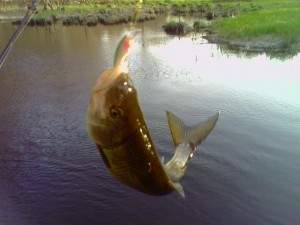 [1]That human beings were created to be creators, to work, is undeniable. The anthropological concept of homo faber, man the tool-maker, attests to this basic aspect of what it means to be human. From a Christian perspective, we confess that human beings make things in a way that imitates their Maker. While God creates “out of nothing” (ex nihilo) and then orders and arranges it, we create in a creaturely way, dependent on God’s primary acts of creation. All this is true about the human person, and it is good that it is so.
[1]That human beings were created to be creators, to work, is undeniable. The anthropological concept of homo faber, man the tool-maker, attests to this basic aspect of what it means to be human. From a Christian perspective, we confess that human beings make things in a way that imitates their Maker. While God creates “out of nothing” (ex nihilo) and then orders and arranges it, we create in a creaturely way, dependent on God’s primary acts of creation. All this is true about the human person, and it is good that it is so.
But ever since the fall into sin work has been bittersweet. This negative aspect of work is communicated to us in the biblical narrative in the form of a curse. As God says to Adam, “Cursed is the ground because of you; through painful toil you will eat food from it all the days of your life. It will produce thorns and thistles for you, and you will eat the plants of the field. By the sweat of your brow you will eat your food until you return to the ground, since from it you were taken; for dust you are and to dust you will return” (Gen. 3:17-19 NIV). As fallen creatures we no longer relate to the world around us, whether the world of plants, animals, human beings, or spiritual truths, the way we did before.
So, on the one hand, work is a basic created good that God has given us to meet our temporal needs and fashion our souls in disciplined obedience. But, on the other hand, work often becomes toil—laborious, monotonous, repetitive, and unfulfilling. This dissatisfaction creates in us a deep and abiding sense that things are not the way they are supposed to be [2]. As the book of Ecclesiastes reads, God has “set eternity in the human heart,” such that the things of this world often pale in comparison with our attraction to spiritual things (Ecc. 3:11 NIV). We imagine, we believe, we hope that there must be a better world to come.
We find this sense of brokenness in something as common as fishing. In a Michigan Radio story [3] this past summer about the challenges facing the fishing industry in the state, veteran angler Ed Patnode mused that “we’d be rich if we could tap into the mind of a fish.” Sometimes the fish seem to like a particular color of lure, and if we could “just get that fish to talk and tell us why do you like pink, or can you tell us what days you’re going to bite pink on and what other factors are influencing your decision to bite this pink lure today,” says Patnode, fishing would be a great deal easier. Patnode’s notion that the challenges of fishing could be overcome if we could understand how fish “think” seems to point toward the possibility that human beings once did, and perhaps will again, relate to the rest of the world in a way that perceives how things really work.
And so while we live an existence marred by the curse, we still live. We still can work, even if that work is more troublesome and difficult than it would have otherwise been. The Dutch theologian and statesman Abraham Kuyper describes this dynamic between things being imperfect and yet still good in his doctrine of “common grace,” an idea enjoying renewed attention with the publication in English of portions of his magnum opus on the subject. In Wisdom & Wonder: Common Grace in Science & Art [4], Kuyper writes that, after the fall, “we can arrive at the knowledge of things only by observation and analysis. But that is not how it was in paradise.” Before the fall we read that Adam “named” the animals, by which we should understand that “Adam immediately perceived the nature of each animal, and expressed his insight into the animal’s nature by giving it a name corresponding to its nature.”
Things are far different today, however, as we see in the case of Ed Patnode and other fisherman, or any professional who deals daily with the natural world. Kuyper writes, “If we want to learn to understand a plant or an animal, then we must observe that animal and that plant carefully for a long time, and from what we observe gradually draw conclusions about their nature. This occurs apart from us ever learning to understand their essence.” Indeed, says Kuyper, “Even their instincts still remain a completely unsolved riddle for us,” to the extent that we do not really know what causes lake trout to prefer pink lures to green or orange on any given day.
In this way the daily routine of work reminds us both of what we have lost and how we are still blessed. It reminds us that amidst the brokenness and blindness of sin, God has not abandoned this world. And so we are called, in our own limited and often wayward way: “Whatever your hand finds to do, do it with all your might” (Ecc. 9:10 NIV). This is the nature of our “lot in life” and our “toilsome labor under the sun” until such time as we “shall know fully” (1 Co. 13:12) the extent of God’s redeeming grace.